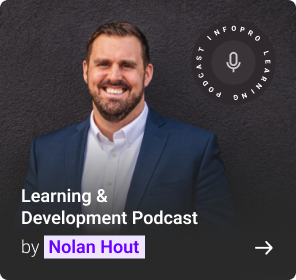External training providers consist of independent professionals or specialized training firms unaffiliated with your organization. These external experts are contacted to educate and upskill your workforce, imparting new competencies and knowledge. On the other hand, in-house trainers are individuals within your organization who share their expertise with colleagues. In 2023, a Statista survey revealed that over half (51%) U.S. training companies outsourced some or all of their workplace training instruction or facilitation.
Outsourcing your company’s training needs can be a strategic move, saving you time, resources, and, potentially, money. However, choosing the right outsourced training provider is crucial to ensure your employees receive high-quality, relevant instruction that aligns with your company’s goals.
Are you thinking about bringing in outside help for your organization’s training needs? Here are some reasons why it might make sense:
- Save money and stay on budget: Outsourcing frequently offers a more budget-friendly alternative to managing training internally.
- Focus on what you do best: Let the experts handle the training, so your team can concentrate on their core responsibilities.
- Get the best of the best: Tap into world-class knowledge and skills that you might not have internally.
- Free up your people: Allow your employees to dedicate their time and energy to additional high-priority tasks.
After determining that outsourcing aligns with your training initiative’s needs, identifying the ideal outsourced training provider is pivotal for your organization’s success, therefore revealing a need for a comprehensive evaluation. To ensure you make a well-informed decision, consider posing the following questions to the external training provider.
1. What Is Your Experience in the L&D Industry?
Finding the right partner for L&D is a bit different than other areas. It has its quirks and things you need to watch out for. When checking out potential outsourced training providers, ensure they have a good track record, specifically in L&D. Ask them about the kinds of L&D projects they’ve worked on – like training programs, online learning, leadership coaching, and performance reviews. It’s also good to understand how well they understand how adults learn best, how to design good courses, and what’s new in the L&D landscape.
2. How Do You Ensure the Quality of Your L&D Solutions?
Quality is non-negotiable in L&D. Ask the outsourcing company about their quality assurance processes. Are there dedicated instructional designers, content developers, and subject matter experts on staff? What methods are employed to assess the efficacy of the organization’s learning and development solutions? Do they gather feedback from learners and stakeholders? Look for a training partner committed to continuous improvement and who can consistently demonstrate their ability to deliver high-quality L&D solutions.
3. What Is Your Approach to Customization and Personalization?
Each organization possesses distinct operational methodologies and unique objectives for learning and development initiatives. When you talk to an outsourcing company, ask them how they make their L&D programs fit each client. Can they change the content, how they teach it, and how they test people to match your company culture and what you want people to learn? The best-outsourced training partners will happily work with you to achieve an effective and impactful leaning outcome.
4. What Is Your Technology Infrastructure and Expertise?
Technology plays a pivotal role in modern learning and development endeavors. Inquiring about the outsourced training providers’ technological capabilities and expertise is essential. For instance, ascertain the following:
- Does the organization employ a comprehensive Learning Management System (LMS)?
- Can their solutions be integrated seamlessly with your existing systems?
- Do they provide mobile learning or microlearning options?
- What is their experience with emerging technologies such as Virtual Reality (VR), Augmented Reality (AR), or Artificial Intelligence (AI) within the Learning and Development (L&D) context?
5. What Are Your Pricing Models and Contract Terms?
Cost is invariably a significant consideration when evaluating outsourced training providers. So, when talking to potential companies, don’t forget to ask how they charge. Do they have a set price for the whole project or charge by the hour or the materials they use? Also, ensure you know whether any extra costs might pop up later. You should find out how they want to be paid and what happens if you need to back out of the deal. It’s crucial to thoroughly understand all financial terms and conditions before executing any agreement.
Conclusion
The 2023 Training Industry Report revealed that 59% of organizations outsource instruction and facilitation, compared to 41% who handle it in-house. Outsourcing learning and development training can be a valuable strategic approach when carefully considered. Asking potential partners, the right questions about their experience, quality, customization options, technology, and pricing can help you choose the right fit for your organization.
Remember, the goal is to enhance your company’s learning capabilities, ultimately driving growth and success. Regardless of whether an organization chooses to outsource or develop training programs internally, prioritizing continuous learning and development initiatives constitutes a strategic investment that will yield long-term benefits for the organization.
Ready to transform your training programs? Our experts are here to help. Discuss your organization’s unique needs and create a customized plan to achieve your goals. Book your free consultation today and discover how we can take your training to the next level.



